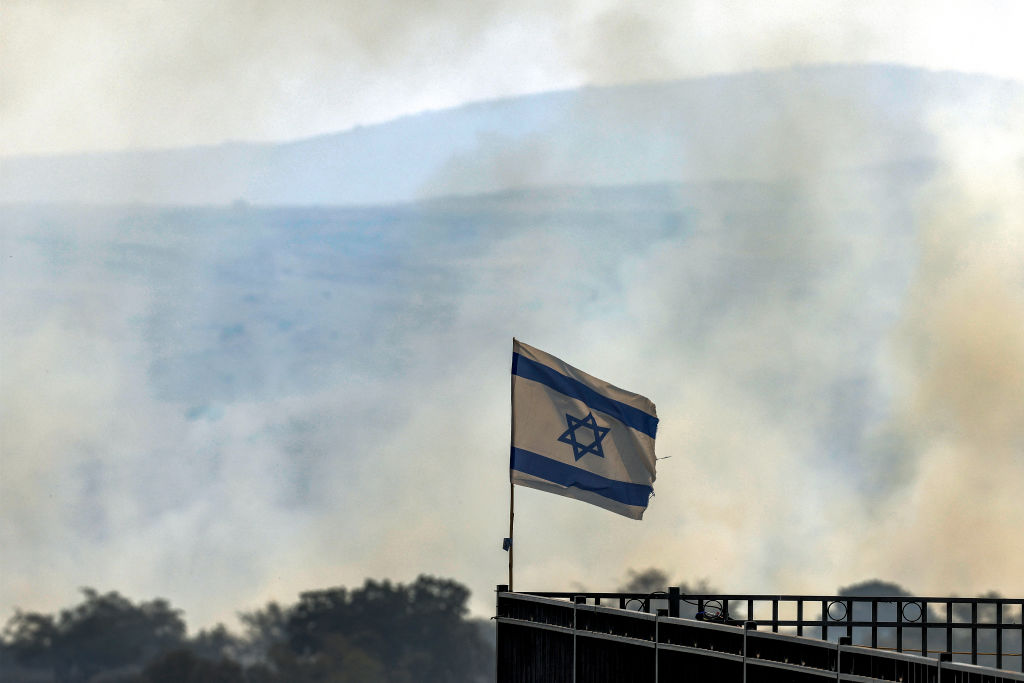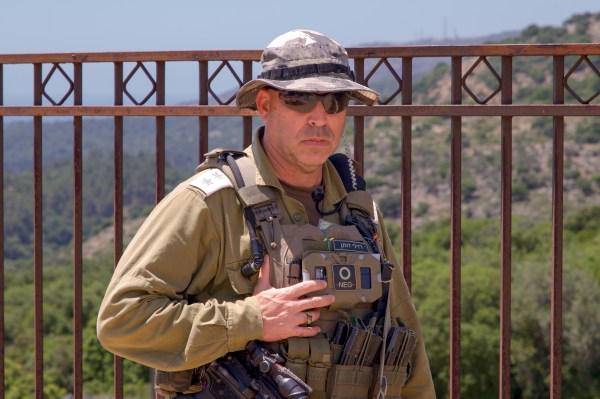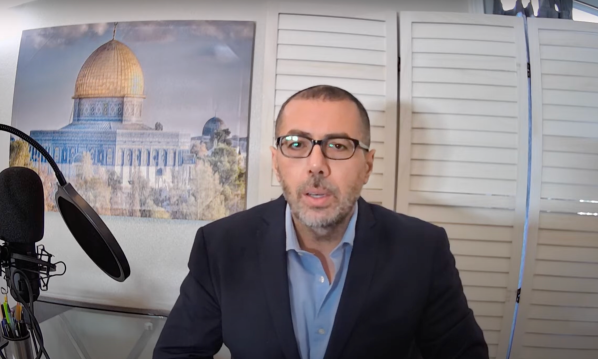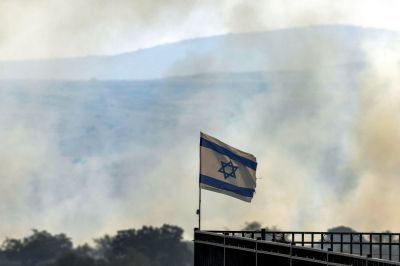Let’s not mince words: The Middle East is on the precipice of the most destructive war of the region’s modern history.
This war did not begin on October 7. It actually began one day later, when Hezbollah, the most powerful proxy of the Islamic Republic of Iran, began attacking Israel. The Israelis, already on their back foot from the Hamas assault in the south of their country, struggled to gain equilibrium.
The Israeli Defense Forces began with proportional responses to Hezbollah’s unprovoked attacks. But when that failed to deter the Lebanese terror group, the IDF steadily stepped up its retaliatory strikes. This, too, has done little. Hezbollah has lost more than 300 of its senior Radwan Forces along the border. An estimated 91,000 Lebanese citizens have been forced to evacuate from southern Lebanon. Yet, Hezbollah continues to fire at Israel.
The Israelis, for their part, have been forced to evacuate roughly the same number of citizens from their northern communities. This is an unacceptable situation for Israelis across the political spectrum, and the public is demanding decisive action from the government to resolve this threat. With peaceful resolutions appearing increasingly elusive, Israel and Hezbollah are inching toward what is expected to be their bloodiest confrontation yet.
A flurry of international efforts has been mounted to forestall the fight. This includes American and French proposals based on a gradual—or at least partial—implementation of U.N. Security Council Resolution 1701. The resolution calls for Hezbollah to withdraw north of the Litani River, which runs laterally across Lebanon, roughly 10 miles north of the border. In theory, this would solve the threat posed by Hezbollah ground forces, which are a legitimate concern after the October 7 attacks by Hamas, a less potent Iran-backed proxy. The resolution also calls for the deployment of Lebanese Armed Forces and U.N. troops to south Lebanon to help restore order, and for all armed groups, including Hezbollah, to disarm.
But the fact is that this resolution was never implemented after the last major dustup between Israel and Hezbollah in 2006. This reflects a lack of international will, as well as zero interest on the part of Hezbollah, not to mention Iran, for a permanent ceasefire with Israel. Why? Because Hezbollah—like its patron in Tehran—seeks nothing less than Israel’s total destruction. This is borne out of the group’s immutable hostility to Judaism and resulting aversion to Israel, a Jewish state, built on what it believes is sacred Islamic and Arab land. The group has therefore declared eternal war upon Israel, to be fought in perpetuity but gradually—”victory in increments,” in the words of its Secretary General Hassan Nasrallah. Over time, the Iranian-led “Axis of Resistance” seeks to amass sufficient strength to deal the Jewish state a “fatal blow.”
Preventing conflict between Israel and Hezbollah has become even more complicated in recent years. Lebanon is a failed state. Elections continue to be held, but the government in Beirut is a feckless placeholder. The country is in debt exceeding $200 billion, while its currency has lost almost 100 percent of its value. No economic or political reforms are on Lebanon’s horizon.
Hezbollah has contributed significantly to this political and economic collapse. But it is also an integral part of Lebanon’s social and political fabric, supported by a sizable bloc of Lebanese Shiites—perhaps the country’s largest sect. The group won the most parliamentary votes of any party in 2022, and it continues to perform well in the polls. Since all Lebanese decision-making is done by sectarian consensus, and Hezbollah commands this large Shiite support, Hezbollah is an immovable object.
Complicating matters further is the sheer power that Hezbollah has amassed. The group has an arsenal of 200,000 rockets and missiles, a fleet of deadly drones, roughly 1,500 precision-guided munitions, and well-trained fighters. Some estimates suggest that Hezbollah’s power is tantamount to a midsize European army. The Lebanese Armed Forces can therefore never forcibly disarm, relocate, or restrain Hezbollah. That would certainly spark a civil war, which the terror group would likely win.
Meanwhile, the international community’s fixation on futile deals has only whetted Hezbollah’s appetite for violence. The group sees the desperation to prevent a wider war. Its leaders note with glee how Israel has been restrained by the Biden administration. Their belief—mistaken and dangerous—is that Israel’s hands are tied by the White House. Nasrallah believes that “America controls Israel,” that the country is merely an American “forward military base. ” Indeed, the Hezbollah leader said in March, “When the Americans put their foot down, threatening to halt funds, Israel quakes in fear. When the Americans halt weapons shipments, the Israeli Chief of Staff quickly takes stock of his remaining ammunition.”
The Biden administration’s baseless signals of public displeasure with Jerusalem are undeniably seen by Hezbollah as a constraint on Israeli freedom of action. They are also treated as a green light for Hezbollah’s provocations. Washington’s decision to pause weapons shipments to Israel surely encouraged Hezbollah’s latest and most dangerous escalation. The group’s attacks suddenly became more destructive, reaching deeper into Israel.
For now, Israelis are weighing two terrible options. They can succumb to growing international pressure to accept a bad ceasefire deal. That would restore a deceptive quiet to their northern border, but it would also leave Hezbollah intact and able to harm Israel in ways that the country has vowed to prevent after the 10/7 attack.
Alternatively, Israel could hit back, initiating a conflict themselves to eliminate Hezbollah. The so-called “Dahiyeh Doctrine” adopted by the Israeli military promises to eviscerate the group’s bases of operations throughout Lebanon.
However, the Israelis are keenly aware of the price of such a war. Hezbollah’s destructive forces—with perhaps help from Iran and other surrounding proxies—could force Israel to fight a war that yields tens of thousands of Israeli deaths, and billions of dollars in destruction.
Off-ramps for this conflict are increasingly difficult to locate. The Biden administration, if it seeks to prevent this war, must quickly reverse its current course. Diplomatic efforts must evolve into pressure campaigns against the Iranian regime and its proxies. And the public attempts to restrain Israel in Gaza and Lebanon must immediately cease. Such messaging is only pushing the region to a conflict of historic proportions.






Please note that we at The Dispatch hold ourselves, our work, and our commenters to a higher standard than other places on the internet. We welcome comments that foster genuine debate or discussion—including comments critical of us or our work—but responses that include ad hominem attacks on fellow Dispatch members or are intended to stoke fear and anger may be moderated.
With your membership, you only have the ability to comment on The Morning Dispatch articles. Consider upgrading to join the conversation everywhere.